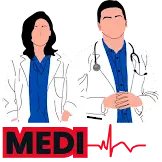Bruce Willis, the
famous action hero whose action films has thrilled our life since our childhood
has been diagnosed with this condition called aphasia which has compelled him
to take a break from his acting career. This is really a sad news for him.
Let’s talk about aphasia.
What’s aphasia?
The
literal meaning according to dictionary means …
"loss of ability to
speak," especially as result of brain injury or disorder.
It is a speech disorder that usually hamper language
expression and understanding
In simpler word, it means one cannot either speak at all or
communicate because they do not understand what you said or because they cannot
speak properly.
It is really a devastating condition that steals a person’s
ability to communicate, making it difficult to write, speak or even understand
what other are saying
Many people do not know about the aphasia but it is more
common condition than Parkinson’s disease, cerebral palsy or muscular atrophy.
So what are the causes?
It is caused by damage to the language center of the brain,
The most common cause of aphasia is stroke. about 25 – 40 %
of the stroke survivor acquire aphasia
The other causes include a brain trauma, infection in the
brain or brain tumor
Sometimes it is also due to degenerative brain disease such
as dementia
How aphasia impacts a person can differ, based on the extent
and site of damage in the brain which is
depicted by the broddmans area
The first one is Broca’s aphasia and the other is Wernicke’s
aphasia .
Now let me tell you, every part of the brain has its own
function and similarly we have Broca’s area in the brain that has the function
that helps us to speak properly.
The other is Wernicke’s area that is responsible for the
speech understanding.
People with Broca aphasia, sometimes called an expressive
aphasia, for example, may eliminate the words “and” and “the” from their
language, and speak in short, but meaningful, sentences. They usually can
understand some speech of others. Because the damage is in the front part of
the brain at the dominant side , is also important for motor movements, people
with Broca’s aphasia often have right-sided weakness or paralysis of the arm
and leg.
for example, if you ask what is your name?
He might write it well but when it comes to speak, he might
utter something very different out of the context. So, there is a speaking
problem while the understanding part is unaffected
The other is Wernicke aphasia. it is called receptive
aphasia meaning the person doesn’t not receive well. If you speak anything
Infront of him, his brain will not be able to comprehend what you spoke so
there is an understanding problem here while speaking centers are okay.
it may speak in long confusing sentences, add unnecessary
words, or create new words. They usually have difficulty understanding the
speech of others.
In Global aphasia, both understanding and speaking
abnormalities can be seen.
Diagnosis
It is Assessed and confirmed by a set of comprehensive language
tests conducted by a speech-language pathologist. These tests include studying
speech, naming, repetition, comprehension, reading, and writing. Making a
diagnosis may also include the use of imaging procedures to look at the brain,
such as:
Computed tomography (CT). This is an imaging test that uses
X-rays and a computer to make detailed images of the body. A CT scan shows
details of the bones, muscles, fat, and organs. CT scans are more detailed than
general X-rays.
Magnetic resonance imaging (MRI). A diagnostic procedure
that uses a combination of large magnets, radio frequencies, and a computer to
produce detailed images of organs and structures within the body.
Positron emission tomography (PET). A computer-based imaging
technique that uses radioactive substances to examine body processes.
Treatment
-
For milder form, treatment can be restorative,
using speech therapy to retrain the brain to recognize words and speak and
write.
-
A complete recovery from aphasia is unlikely if the symptoms
last longer than two or three months after a stroke
The goal of treatment is to improve your
ability to communicate through methods that may include:
-
Speech-language therapy
-
Nonverbal communication therapies, such as
computers or pictures
-
Group therapy for patients and their families
